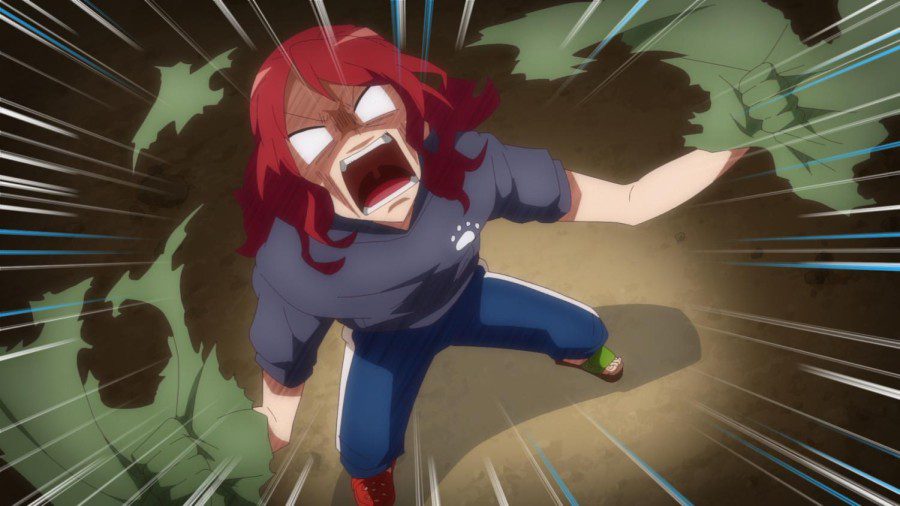Review: Romance is dead, but ‘Romantic Killer’ brought it back
In an absurd subversion of the high school love story, “Romantic Killer” brings a refreshing take on the shōjo protagonist archetype.
November 16, 2022
The Netflix manga-to-streaming adaptation, “Romantic Killer,” embodies the charming fuzzies of a romantic comedy without forcibly shoving that gooey love down your throat.
During her first year of high school, Hoshino Anzu (Rie Takahashi) finds herself thrown into a dating simulator. With the loss of her three loves — chocolate, video games and her pet cat, Momohiki — Anzu wants nothing to do with what wizard Riri (Mikako Komatsu) markets as a magical solution to Japan’s low birth rate. To disprove the process and to have her three loves returned to her, Anzu becomes a bonafide antiromantic and tries her hardest to avoid participation.
Soon after Riri casts their spell, Anzu ironically becomes the female love interest in a slice-of-life shōjo romance. The day after her family moves to the United States with her cat, she runs into the cold, but attractive Tsukasa Kazuki (Yūichirō Umehara).
With magic now as the acting catalyst, a sequence of feigned coincidences become the foundation for every character introduction, and pretty much every plot development. Anzu learns that Kazuki just so happens to attend her high school, and she accidentally breaks his cell phone when they first meet. After unexpected rainfall and discovering that his apartment is somehow the only one in the building flooded beyond repair, Kazuki makes a fair point — one month’s rent is approximately the same as the cost of a new phone.
“Romantic Killer” makes fun of the basic romantic tropes and the little time the show spends on them parallels their shallowness. The show quickly becomes a smash cut of tried and true, iconic romantic moments. Before Anzu knows it, the boy that she met less than than a week ago lives in her house, her possibly magic-summoned childhood friend Junta Hayami (Gakuto Kajiwara) suddenly wants to walk her to school, and the unfathomably rich and popular Hijiri Koganei (Natsuki Hanae) pursues her because she didn’t immediately fall in love with him.
Anzu isn’t indifferent to every heart-fluttering event, and it makes her feel more relatable. The way she forcibly tries to avoid falling for every love interest — like overlaying her cat and the 2D characters that have already stolen her heart over the boys’ faces — never fails to cause confused, yet amused laughter. Maybe it’s the use of emphatic pink borders, blushing faces and not-so-subtle heartbeat sound effects, but some of Anzu’s interactions with her love interests are very sweet.
While most of the plot focuses on the will-they-won’t-they of Anzu and each of her love interests, “Romantic Killer” shows healthy male and female relationships. Throughout the series, it eases into the friends-to-lovers trope. The arm’s distance at which Anzu keeps them away is what makes the show so refreshing. Sure, Anzu is trying to circumvent all of Riri’s romantic efforts, but she is honest with every character from the beginning. With such clear boundaries, her playful nature, brazen loyalty and extensive care aren’t misconstrued as romantic interest, but seen as admirable characteristics.
The show clearly intends to make her fit into the not-like-the-other-girls trope. Anzu intentionally strays away from the delicate, feminine images that many of her shōjo counterparts have accepted. She embraces an over-masculinized face, intentionally unflattering angles and the occasional action-sequence-like summoning circle.
When the narrative does move beyond Anzu and her boys, it’s primarily to add a personal dimension to each character. The character development is anything but bad, but it happens too late in the show. Viewers cruise through mostly light and happy scenes filled with unexpected promise and fluttering stomachs, clearly intended to warm viewers’ hearts. While the shift is gradual at first, the show suddenly gets heavier than expected and really shoots for that TV-14 rating.
The first season leaves viewers excited for what’s to come. With her relationships, both romantic and platonic, which evolve beyond plot devices or magical pawns to avoid, Anzu faces her own character arc and the changes in her personal desires. The show’s self-awareness avoids the secondhand cringe that some romantic shows may make you feel, putting forth a model for a refreshingly smarter variation on the romantic comedy genre.
Contact Mayee Yeh at [email protected].

























































































































































